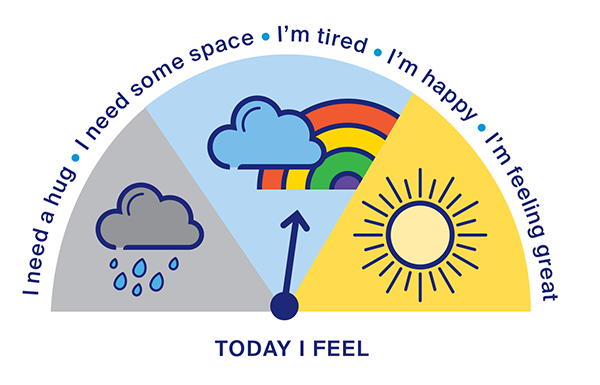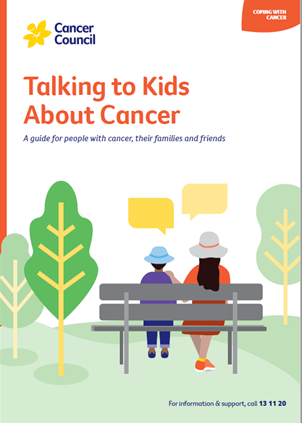- Home
- Cancer Information
- Family and friends
- Talking to kids about cancer
- Talking about treatment
- Family life during treatment
- Managing emotions
Managing emotions
Everyone responds differently to the treatment phase. Anger, crying and withdrawal are some of the possible reactions. These can be protective responses that allow a child or young person time to deal with the information.
Learn more about:
Overview
Some children may hide their feelings because they do not want to add to their parents’ stress. Even if your child’s behaviour doesn’t suggest they are struggling, let them know you appreciate how hard this situation is for them.
Children will express their emotions differently depending on their age and nature. If your kids’ reactions seem unusual or extreme, consider getting some professional support.
Ways to manage emotions
Ways to help them to understand and manage these emotions, include:
- Encourage, but don’t push, kids to identify and name feelings. For younger children, you may need to recognise and identify the emotion for them (e.g. “you look angry” or “you seem really worried”).
- Reassure them that there are no right or wrong feelings. Everyone reacts in their own way.
- Let them know that anger, guilt and sadness are normal feelings. You feel them too and it is okay to talk about them.
- Remind them that they can talk to you anytime about how they’re feeling.
- Discuss ways to manage anxiety and stress.
- Make sure they have plenty of opportunities for physical activity and spending time with friends.
- Provide plenty of physical comfort, such as hugs and cuddles.
- Offer creative ways for children to express their emotions.
- Create everyday opportunities for humour and fun. Let your children know that it is alright to joke and have fun. Laughter can often relieve tension and help everyone relax.
Changed behaviour
“My husband, Bruce, had a brain tumour and his personality changed because of it. At the dinner table one night, our 4-year-old, Emma, announced, ‘I wish Daddy was dead.’ I calmly asked Emma what she meant. She replied, ‘I don’t like the man who’s in my Daddy’s body. I want my real Daddy back.’ I could then explain why Bruce’s behaviour had changed.”
DEBRA, MOTHER OF A 4-YEAR-OLD
The emotions thermometer
The physical and emotional health of a person with cancer will vary during and after treatment. It can sometimes be hard to let your family know how you’re feeling, and they might find it hard to ask.
An emotions thermometer may help. This simple tool allows you to show how you’re feeling every day. You can make one yourself and ask the kids to help, or there are many versions available online. Just search for “emotions thermometer”. Choose which feelings to include and add a pointer that moves to the different feelings.

Living with uncertainty
One of the challenges of a cancer diagnosis is dealing with uncertainty.
When first diagnosed, many people want to know what’s going to happen and when it will be over.
But living with uncertainty is part of having cancer. There are some questions you will not be able to answer. Learning as much as you can about the cancer and how it’s treated may make you feel more in control.
You may need to give your family regular updates on how the treatment is going.
Talk about any uncertainty with your children by saying something like, “The doctor is confident that this is the best treatment for me, but if that changes, we’ll let you know, and we may have to look at another type of treatment.”
→ READ MORE: Encouraging family time
Podcast: Explaining Cancer to Kids
Listen to more episodes from our podcast for people affected by cancer
More resources
Prof Jane Turner AM, International Psycho-Oncology Society President Emeritus,The University of Queensland, QLD; Taylor Baker, Consumer; Dr Ben Britton, Principal Clinical and Health Psychologist, Head of Psychology, Hunter New England Mental Health, NSW; Camp Quality; Dr Lisa Cuddeford, Head of Department, WA Paediatric Palliative Care Service, Perth Children’s Hospital, WA; A/Prof Peter Downie, Head, Paediatric Haematology–Oncology and Director, Children’s Cancer Centre, Monash Children’s Hospital, VIC; Dr Sarah Ellis, Clinical Psychologist, Kids Cancer Centre, Sydney Children’s Hospital, NSW; Malia Emberson-Lafoa’i, Consumer; Kate Fernandez, 13 11 20 Consultant, Cancer Council SA; Jane Gillard, Consumer; Mary McGowan OAM, International Childhood Cancer Advocate, VIC; Annette Polizois, Senior Social Worker, Women, Family and Emergency Care Team, Royal North Shore Hospital, NSW; Rhondda Rytmeister, Clinical Psychologist, HeadWayHealth (formerly Snr Clinical Psychologist, The Cancer Centre for Children, Westmead, NSW); Nadine Street, Head of Social Work and Social Welfare, HNE Mental Health Service, NSW; Warren Summers, Online Counsellor, Canteen, NSW.
We would also like to thank the health professionals, consumers, organisations and editorial teams who have worked on previous editions of this title, and we are grateful to the parents and young people whose real-life stories have added to the richness and relevance of this book.
We thank and acknowledge Dr Paula K. Rauch, MD, Founder and Director, Marjorie E. Korff PACT (Parenting At a Challenging Time) Program and Associate Professor of Psychiatry, Harvard Medical School, whose research and writing on helping parents talk to their children about cancer was used as source material for this book and has been adapted in several sections: pages 8–11, How children understand cancer; page 22, Answering key questions: Are you going to die?; page 26, Involving the school or preschool; pages 30–31, Hospital visits; and pages 36–37, Encouraging family time. We also thank the American Cancer Society for permission to use and adapt material on pages 8-11 from its book Cancer in Our Family: Helping children cope with a parent’s illness (2013); Macmillan Cancer Support for permission to use its book Talking to Children and Teenagers When an Adult Has Cancer (2013) as a source of information; Jessica Watt, Oncology Social Worker, The Children’s Hospital at Westmead, for her contribution on page 20, When another child has cancer; and Diane McGeachy, Hobart Counselling Centre, for contributing material for page 37, Spending one-on-one time.
View the Cancer Council NSW editorial policy.
View all publications or call 13 11 20 for free printed copies.
Need to talk?
Support services
Coping with cancer?
Speak to a health professional or to someone who has been there, or find a support group or forum
Work and cancer
Information for employees, employers and workplaces dealing with cancer
Cancer information
Cancer treatment
Chemotherapy, radiation therapy, surgery and other treatments
When a student’s family member has cancer
How the school community can offer support

